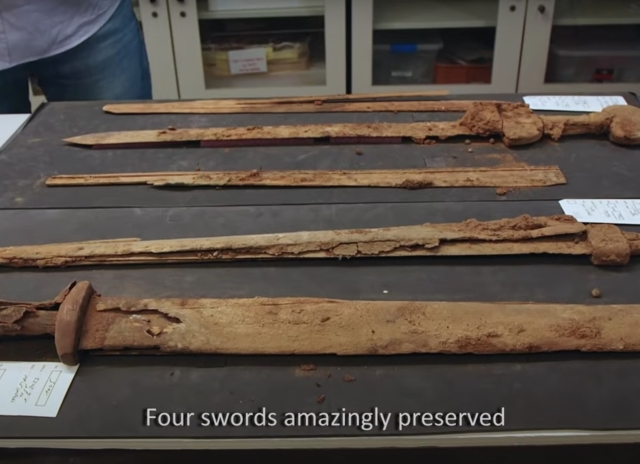In an unprecedented archaeological find, researchers have unearthed four remarkably well-preserved Roman swords in a cave in the Judean Desert, near the iconic Ein Gedi National Park. The historical artifacts are believed to have been seized by Judean rebels during the Bar Kochba Revolt, which unfolded between 132 and 135 CE.
The Bar Kochba Context
The Bar Kochba Revolt, also known as the Second Jewish Revolt, was a significant armed conflict where Jews in Judea sought to overthrow Roman rule. Led by the charismatic rebel Simon Bar Kochba, the uprising is considered one of the most pivotal events in Jewish history. The discovery of these swords, experts assert, will provide invaluable insights into the late stages of this intense struggle against the Roman occupiers.
Wow. Actual weapons from Bar Kochba revolt discovered at Ein Gedi. Wow. https://t.co/9DwaUVZUjJ
— David Hazony (@davidhazony) September 6, 2023
The Archaeological Expedition
The swords were discovered as part of the Judean Desert Archaeological Survey, a multi-year initiative aiming to identify and safeguard the rich historical heritage found in over 800 caves across the Judean Desert. The survey is a collaborative effort between the Israel Antiquities Authority (IAA), the Archaeology Department of the Civil Administration in Judea and Samaria, and is partially funded by the Ministry of Jerusalem Affairs and Heritage.
A Serendipitous Discovery
Dr. Asaf Gayer of Ariel University, geologist Boaz Langford of Hebrew University, and IAA photographer Shai Halevi initially returned to the cave to utilize multispectral photography on a previously discovered stalactite with an ancient Hebrew inscription. During this endeavor, Dr. Gayer noticed a Roman pilum—a shafted weapon—jammed into a tight rock crevice, along with pieces of carved wood later identified as scabbard parts.
The Significance of the Find
The metalwork, handles, and scabbards of the swords have been astonishingly well-preserved, thanks in part to the desert’s arid climate. “The swords look like they could still be wielded today, despite being forged nearly 2,000 years ago,” said Langford.
Three of the swords are Roman spatha swords, with blades measuring 60 to 65 centimeters. The fourth is a ring-pommel sword, featuring a shorter 45-centimeter blade. All of them were found concealed in the same crevice, three with their blades still sheathed.
“This discovery is a unique time capsule, extraordinarily rare on an international level, that will cast a new light on the final phases of the Bar Kochba revolt,” stated Dr. Eitan Klein, co-director of the IAA’s Judean Desert Survey.
Broader Archaeological Context
Beyond the discovery of the Roman swords, this ongoing cave survey has already yielded other substantial finds, such as fragments of the Dead Sea Scrolls discovered in 2021 and a rare Bar Kochba minted half-shekel coin. The excavation also revealed artifacts dating back to the Chalcolithic and Roman periods, including a bronze Bar Kochba coin found at the cave entrance that could help date the concealment of the weapons.
This is a silver coin from the Bar Kochba rebellion
— Shirl the Sabra (@sabra_the) July 22, 2023
One side features the Jewish Temple facade with the rising star, surrounded by "Shimon". The other side features a lulav & reads: "to the freedom of Jerusalem".
Minted 132–135 CE.
Our roots run deep..
Via: Stop The Lies pic.twitter.com/dEyQSJaZa7
Future Directions
The findings will be discussed in detail at an upcoming conference in Jerusalem and are published in the volume “New Studies in the Archaeology of the Judean Desert: Collected Papers.”
“This is an extraordinary chapter in our understanding of the Jewish resistance against Roman oppression. These swords aren’t merely artifacts; they are a testament to a tumultuous period in our history that continues to captivate us today,” concluded Dr. Klein.


